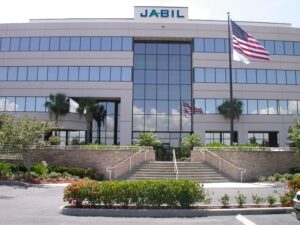On-campus Jabil institute sparks anticipation from students

A plan drafted on a bar napkin two years ago has now become the USF Jabil Innovation Institute, a multi-million dollar institute combining the College of Engineering and the Muma College of Business.
Senior Vice President of Advancement and CEO of the USF Foundation Joel Momberg and Jabil CEO Mark Mondello jotted the idea down with the intention to bring a platform to USF focused on student success before and after graduation.
“I graduated from USF with an engineering degree and going into my last semester, I had no idea what I was going to do,” Mondello said. “No idea where I was going to work, what I was going to do, I just knew I was going to school. What [the Jabil Institute] also allows is an amazing platform for the wonderful students at USF to get their feet under them and work on real projects.
“We want to give students, whether they’re on the business side or engineering side, the opportunity to work on real stuff.”
The announcement of the USF Jabil Innovation Institute took place on Oct. 24 in the Marshall Student Center Ballroom.
The worldwide manufacturing services company Jabil will contribute $1 million for the launch of the institute, which consists of a $800,000 gift and $200,000 in research support.
In the weeks following the announcement, students shared their expectations and the impact of the institute on their future.
Kush Mathur, a junior majoring in electrical engineering, said that the partnership could potentially become a pathway for students to obtain internships and full-time roles at Jabil.
“I believe the partnership presents a great opportunity for students to not only do well in school but also get involved in real-time hands-on projects with a company like Jabil,” Mathur said. “It really gives students the opportunity to connect with industry-experienced professionals and work on significant projects without leaving the campus.”
Jabil will lease space at the Tampa Bay Technology Incubator (TBTI) in USF’s Research Park, according to the USF website. In addition, Jabil will participate in USF innovation initiatives and lead programs for client companies at TBTI.
Junayed Jahangir, a sophomore majoring in finance, said he believes Jabil’s collaborative efforts will support one another.
“It’s a very visionary and mutually beneficial deal for both Jabil and USF,” Jahangir said. “With the partnership, USF students will have more access to leadership, mentorship and skill development programs offered by Jabil which will also give them a boost in the professional world.”
Besides giving more opportunities to students, Mondello said that this partnership will be a key factor to help cultivate diversity at Jabil.
“We spend a lot of time inside our company talking about diversity and inclusion,” Mondello said. “By getting more formal access to the younger population at a great university like USF, it helps expand our diversity of thought. It makes our solutions and our customer service better.”
Tracy Pham, a sophomore majoring in computer sciences, said that the partnership will give students more access to research opportunities on campus.
“I think this is an amazing opportunity for students who are like me who get bored easily in classes and want to do more but don’t necessarily have the funds or guidance to get projects started,” Pham said.
“Because I enjoy doing research for USF, but don’t have the luxury of doing those glamorous internships in other states, being able to explore my interests in research on campus because of this new tool will give me a chance to develop locally in the comfort of my home campus while still being exposed to industry professionals at Jabil.”
Jabil currently has more than 200,000 employees across its 100 plants in 28 countries. Mondello said in an interview with The Oracle that the partnership will begin immediately.
“A lot of students can benefit heavily from the hands-on projects as they are the best learning experiences for students and an opportunity for them to showcase what they learn in class,” Mathur said. “Project experience of any sort is the most vital thing for employees, hence, I believe it is the start of great things to come.”






